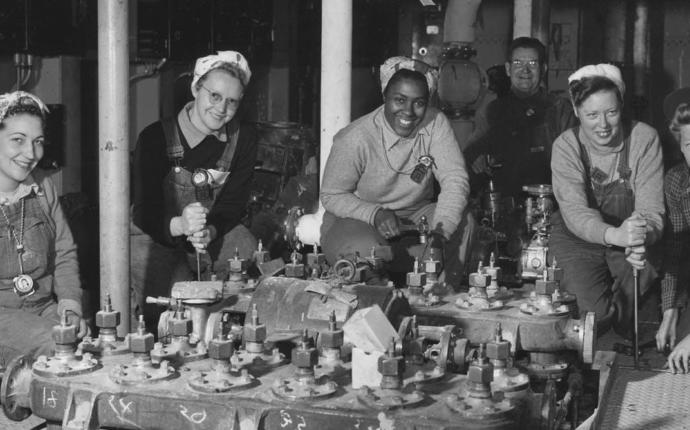Let me start this MyTake by saying that I believe that being in a committed relationship with a quality partner and working together as a team is most likely to result in the best outcome in life. It doesn’t assure daily happiness - struggles will always find you - but overall, a team supporting each other will have a much easier time overcoming those struggles.

Many if not most of us are aware that for a very long time, it was a normal, expected thing for people to get married and have families and stay together for life. This may describe your parents, and it’s even more likely to describe your grandparents, and it’s probably what you were taught to expect to - but you may have discovered, with great confusion - that things don’t seem to be working that way anymore, and that’s frustrating and unsettling, and you want to know why things changed. That’s what this article is about.

The seeds of this change happened with WWII in the first half of the 1940s, when women went to work in factories to replace all the men who were sent overseas to fight. When the war was over and the men returned, many women happily went home to start families and raise children, but a few of them missed working outside the home and earning their own money, and began a movement for women’s rights, which we now usually refer to as “Second-Wave Feminism.” This movement took another generation to really catch hold, but the growth of the American economy in the late 40s and 50s, as American helped rebuild Europe and Japan, led to middle-class Americans being able to send their children - including girls - to college en mass for the first time in the 1960s, and by now, those early 2nd-Wave Feminists of the 40s were teachers and college professors - AND they’d been co-opted by pro-Marxist Soviets via one of many KGB subversion campaigns (but that’s a whole other story).
https://www.eviemagazine.com/post/why-modern-feminism-wants-to-get-rid-of-the-family/
And while the first Women’s Studies courses were being taught in college, other Radical Feminists were hard at work changing divorce and child custody laws to heavily favor women in the name of “equality.” Women in the 60s (Boomers) were also being told that they needed to stop being wives and mothers and to seek careers of their own, and like before, that generation didn’t embrace that idea widely - but the following generation, the GenXers, did.
Colleges expanded significantly in the 1960s, more than doubling capacity, and expanded again in the 1980s, doubling again. Women were encouraged to follow what just 2 generations before had been the path available only to upper-class men and a few prodigies on scholarship: a 4-year University education (in many cases followed by graduate school and advanced degrees) and a career working outside the home. In fact, by the 80s, this had become the expected path, and women choosing to start families and be housewives was widely and publicly derided by RadFem leaders as being “a traitor to your gender.” Needless to day, this was pushed even harder onto Millennial, with the late 90s-through the 2000s being the peak of RadFem power.
The results of all of this has been a few key points that have massively affected relationships in Western societies:
- Women are choosing (or being pushed to choose) college and careers over motherhood, at least in their 20s. This has caused women to go into massive debt, and has kept most women from having children until their late 20s or early 30s - and some even later, leading to a rise in expensive and nerve-wracking fertility treatments to conceive past her prime fertile years, as well as a noted increase of children born with congenital disease or mental and behavioral problems.
- Women have largely abandoned traditional female roles, in their dress, in their skills, and in their attitudes, and have become more and more like men, and are competing directly with men in many respects.
- The laws and social attitudes have changed such that men are massively disadvantaged in marriage, parental rights, and divorce.
- Male children are being taught, at home and increasingly in school, that masculinity is toxic and that natural male tendencies are bad and should be suppressed.
- Hypergamy: with women increasing their own education and income, they’re no longer satisfied with average or even above-average men - they insist on men who are well above their level, no matter how high their level becomes, but there simply aren’t nearly enough such men to go around. Nevertheless, huge numbers reject anything but a Top 10% man, even if they’re single for years. Most can attract high-value men with casual sex - and often do - but many don’t realize or won’t accept that those men would never consider them for a relationship, so they hold out for one, ignoring men at or near their own level.
- Women believe that men will find it desirable that she has an advanced education and a career, and are shocked when they do not. No matter how often men tell them otherwise, most women can’t accept that men aren’t looking for competitors, they’re looking for someone who brings to the table things he isn’t already providing: a wife, mother, and homemaker. When women say “I’ve got this degree and this career”, men hear “I spent my prime fertility years in school and getting my career going, I have a ton of student (and consumer) debt, and I’m unlikely to be around when you need me because I’ll be at work.”
For women who didn’t take relationships, marriage, and children seriously and rushed into marriage or children with an “exciting” bad boy, only to be a single mom in her late 20s or early 30s, her value to most men is extremely low - and the further she is past 30, the lower her value is likely to be. Many women in their mid-30s still believe that they have the kind of social market value they had in their 20s, and are still looking for a super-high-value man as if she was a “social market billionaire” herself as she once was, having no understanding that, in her mid-30s, and especially if she has children, her “net value” has plummeted, and while she thinks she’s an 8 (like she was at 24), she’s really a 3 to men in her target age group.
That’s because, aside from sex, most of what she’s bringing to the table has a low or even negative value to a man, causing high or even mid-value men to reject relationships with those women.
Men know how to evaluate a deal - to weigh the pros and cons and to analyze the costs and benefits - and being in a committed relationship (except with women who reject Feminism and who prioritize being a mother and wife rather than a career) simply isn’t worth the high cost and risk that men are required to accept if the take the deal - and so, increasingly, men are no longer interested on signing on the dotted line. It’s far too often a one-sided deal, and men today know it.
The other thing is: women have never been less happy, and more women than ever are single, are single parents, are the sole providers of their household, and are disappointed with their careers. They've gotten their career, but it turns out that having a career doesn't really fulfill them, and as they progress in their career, the career is ever more demanding and time-consuming, so even if she's making more money, she has less time to enjoy it, and that leads to growing depression. It is also leading to a lot of women who realize that what she really wants is a relationship and a family. But the realization comes too late in so many cases, with her biological clock having nearly run out or already run out.
Both men and women are worse off as a result. Who knew that huge societal changes would have huge unintended consequences?
 Holidays
Holidays  Girl's Behavior
Girl's Behavior  Guy's Behavior
Guy's Behavior  Flirting
Flirting  Dating
Dating  Relationships
Relationships  Fashion & Beauty
Fashion & Beauty  Health & Fitness
Health & Fitness  Marriage & Weddings
Marriage & Weddings  Shopping & Gifts
Shopping & Gifts  Technology & Internet
Technology & Internet  Break Up & Divorce
Break Up & Divorce  Education & Career
Education & Career  Entertainment & Arts
Entertainment & Arts  Family & Friends
Family & Friends  Food & Beverage
Food & Beverage  Hobbies & Leisure
Hobbies & Leisure  Other
Other  Religion & Spirituality
Religion & Spirituality  Society & Politics
Society & Politics  Sports
Sports  Travel
Travel  Trending & News
Trending & News 


Most Helpful Opinions